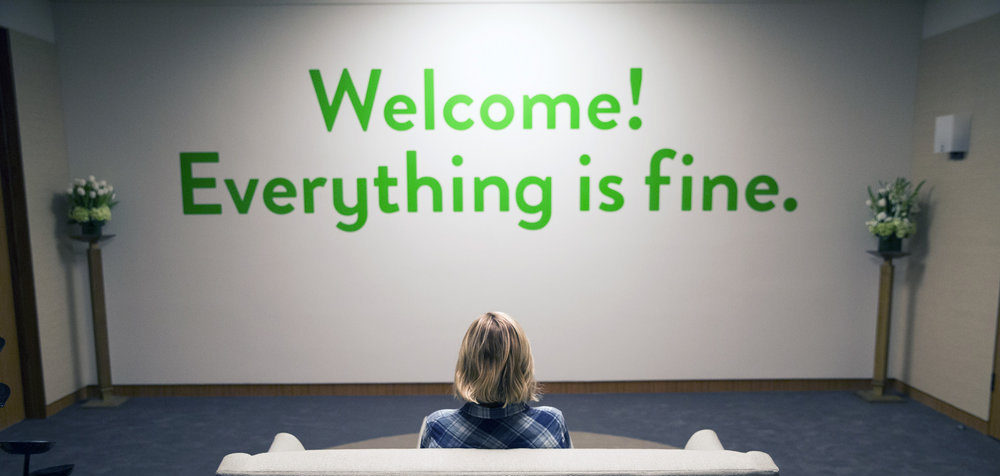The day was finally here: “Schur Day.” We all arrived to our lunch with Mike Schur in outfits that said “Today I’m meeting a famous person, I better have my shirt together.” We were bright eyed and bushy tailed hoping that Mike could tell us all of the secrets of The Good Place and what the heck we had to do to make our dreams in entertainment come true. We sat in a big circle and ate lunch (only nervously spilling one glass of water) and began our deep dive into the brain of Mike Schur.
Lunch: The Good Plates
At lunch, we covered three main topics: the philosophy in The Good Place, the mechanics of Mike’s process for creating his shows, and the television industry as a whole and how it is changing.
We started off by talking about Philosophy and what kind of work goes into making The Good Place as accurate as possible without feeling like a lecture. Mike told us that the cast was really excited to learn about the philosophy they talk so much about on the show (except for Ted Danson who doesn’t really care. I mean at 70 how much can you really be expected to give a shirt about philosophy).
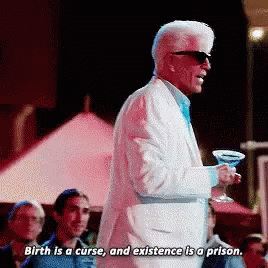
As it turns out, making philosophy exciting for both the cast and the audience means a shirt ton of reading for Mike. But don’t worry, he likes homework, just refer to his smart-brained Harvard degree. In order to present a condensed yet faithful representation of all the different philosophical theories talked about on the show, Mike had to have a well developed understanding of these theories himself. He said that Eleanor’s journey through learning ethics and moral philosophy mirrored his own — many of her reactions are based on his, and they represent the frustrations of trying to find a system of ethics that you can practically adopt for your own life.
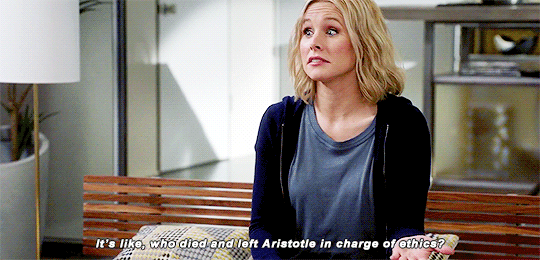
Mike himself is very Aristotelian in his own philosophy, largely in part because The Good Place is founded on the idea that humans can better themselves (sounds like virtue ethics to me!). When asked if people are fundamentally good or bad, Aristotle inspired his answer: that human nature is like a dart board of different characteristics, some good, some bad. Most of our darts fall across the spectrum, but by surrounding ourselves with people who have lots of good characteristics (a soul squad, if you will), we can learn to develop these virtues in ourselves as well.
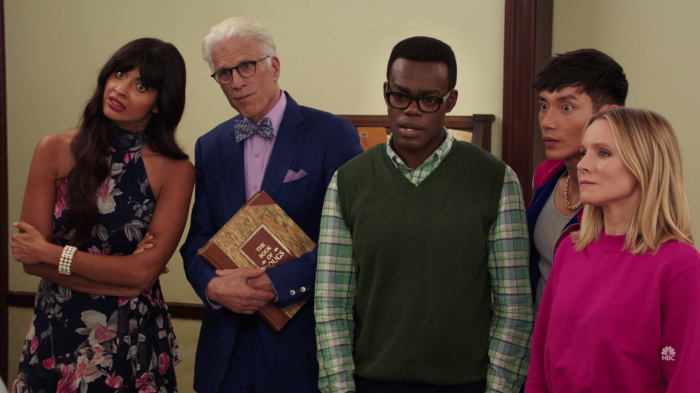
Mike spoke to his own experience within the industry and his predictions for TV. According to him, this is the best time to be a TV writer. There is more freedom than ever and no longer as strict of guidelines regarding structure and content. Netflix funds whole seasons and doesn’t require writers to go through pilot season. This means writers don’t have to put so much weight on one episode. The sheer quantity of shows being made is astounding, too. Studios can profit off of them, even if they’re a bust, by selling them globally where content is needed. Mike himself profited from this phenomenon when creating The Good Place. Because his network no longer depends on the syndication model to make a profit, he was able to propose his story within the exact parameters that he wanted. Rather than try to create a show that could run for as long as possible, which often posed creative difficulties for television shows (see: seasons four and five of LOST), he could tell a constantly changing, self-contained narrative within a four 13-episode season model, which would not have been possible ten years ago.

However, the golden age of television isn’t all frozen yogurt and shrimp cocktails — there is a negative side too. Mike described the phenomenon as a bubble waiting to burst. The invisible hand of the economy will step in. Studios will start losing money and people will get fired.
The other negative side effect of the TV boom is more cultural. Back when there were no streaming services, TV was a unifying force in American culture. Everyone would watch the same shows at the same time. It provided common ground and a common identity. Nowadays, Game of Thrones might be the closest we can get to that same experience. But that show is NOT for everyone. Just ask my mom.

We also got into the mechanics of how Mike writes his scripts. In particular, we were curious about his script structure (or as we like to call it, “scripture”) and why some of the episodes were originally written in three acts, but were ultimately filmed in four acts. Mike told us that although NBC gives him an uncommon amount of free reign when it comes to constructing The Good Place, there are still rules that function as creative obstacles, such as writing the episode in four acts to allow for maximal commercial breaks. Though that is a rule that is non-negotiable and all of the episodes of The Good Place were filmed and aired in four acts, Mike said he still writes his scripts the way he likes, often in three acts only, as a small act of protest against some of the restrictive conventions of traditional network television.
Mike also got into the creative process of writing his scripts. It’s not that crazy. It involves late nights and lots of index cards (and, at least on SNL, a lot of cigarettes). According to him, one of your ideas sticks with you and one of the index cards starts glowing a little. But it’s not magic. It’s a lot of grunt work—coming up with lots of ideas and seeing which ones stick.
We learned about his views on diversity casting—that television is better when it shows an interesting and realistic depiction of the world. He made a point to stray away from one religious tradition because Muslims, during the creation of the show, faced a lot of persecution in the Western world. He wanted to make a show that reflected our world accurately—Heaven, therefore, was not American-centric place. On the show-biz side of things, Schur discussed the problem of how much television is being made. There is a bubble waiting to burst and a unified cultural conversation around TV no longer exists. In the midst of the 2 hour lunch we also got around to some philosophy questions. He doesn’t want to sound preachy in his shows, but he let on that season 4 asserts more definitively how to live a good life. MOST IMPORTANTLY, however, we learned that Mike Schur identifies most with Jim from The Office, Ben Wyatt from Parks and Rec, and Amy from Brooklyn 99.
Evening Discussion: Can Television Make Us Better People?
Later that day, we gathered again with a larger audience to hear Mike, Prof. Sullivan, and Prof. Becker try to answer “Can TV Make Us Better People?” It was interesting to see Mike on stage versus in a private lunch because, as we all do, he seemed to put on a show and we got to see that this writer did have an entertainer inside of him. We got to hear the panelists speak to how the show operates and how people interact with philosophy and entertainment. Television consumes so much of our lives, it is inevitable that it has an effect on how we think and act, whether that effect is positive or negative. So, ultimately, they concluded that shows can make us better people. They can teach us philosophy, help us learn about ourselves, and even influence how we live our lives. They can also help us through tough times, which, as one new freshman in the audience attested, is exactly what The Good Place did for him. Even though, as Janet tells us, there isn’t just one answer the mystery of life and the universe, when you find someone else (or a TV show) that helps you get a little closer to the meaning of existence, it’s euphoria.
Here is the link to the full talk: https://youtu.be/cWCVuml10EI

At the close of the talk, Notre Dame did something unprecedented. In the TV show Parks and Rec, there is a famous little horse named Lil’ Sebastian. He is beloved by all the Pawnee residents, and, in the show, has an honorary degree from The University of Notre Dame. So, when Mike Schur came to campus, it was only fitting that we do something BIG. Dean Mustillo presented Schur with an official document declaring that the popcorn-maker in DPAC would hereby be dedicated to Lil’ Sebastian. A picture of the historic moment is below:
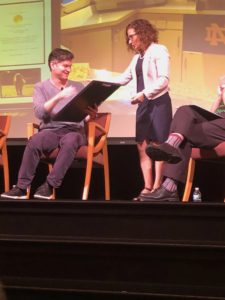
Finally, some pieces of advice given to us by Michael Schur:
- For writers: all comedy writers are wounded birds, the process is scary. You just need to generate lots of ideas and weed out the bad ones.
- Take risks. Mike said he owed it to writing itself to push boundaries and make a show like The Good Place.
- Don’t be a utilitarian. Enjoy that $80 blanket.
- Watch what you consume! Most TV will make you a bad person.
- Realize when you fall into the trap of us vs. them (EVEN when when it comes to the University of Michigan)
- Don’t be an ashhole.
We rate this Chapter:
Coolness: broke the scale
Dopeness: unprecedented
Dancing ability: unclear. we didn’t have the guts to ask Mike to dance with us.
Freshness: off the charts
Smart-brained: worthy of honorary degrees from Notre Dame, Michigan, AND Harvard
THANK YOU MIKE SCHUR!!!!!
